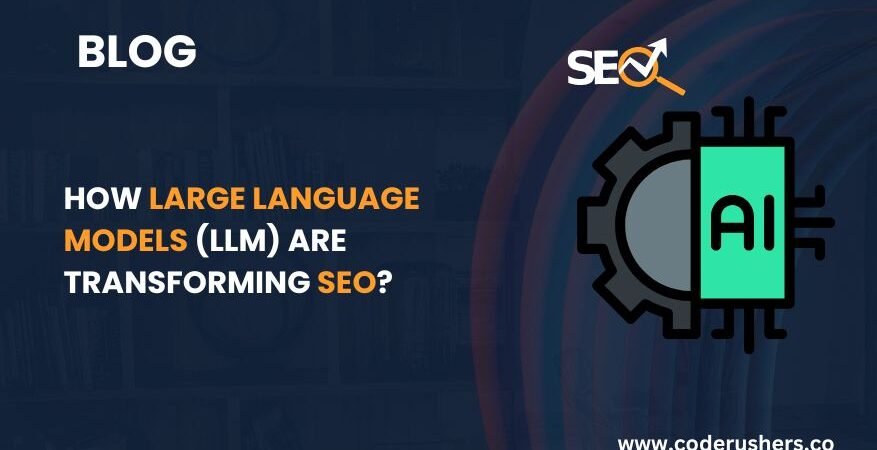Don’t you think your questions are getting answered a little too accurately these days? Well, that’s the new LLM SEO that’s working behind the scenes.
You type in something half-formed, maybe not even sure what you’re looking for, and the top result nails it. It’s like the internet finally understands you.
See, search engines aren’t what they used to be. They’re using massive AI models known as Large Language Models, like Chat GPT 4o, that actually understand what you’re trying to say. And more importantly, they’re deciding which content is good enough to show you… and which content gets ignored.
Let’s break down what LLMs are actually looking for, how to show up in AI-powered search, and what strategies are working right now.
What is LLM in SEO and How is it Transforming?
LLM stands for Large Language Model. Basically, it’s an advanced type of AI that can understand and generate human-like text.
Thanks to Google’s AI-driven search updates, LLMs are now the lens through which your content is judged. They don’t just scan for keywords on your website. They read for meaning, context, and flow.
In the past, SEO was a numbers game. Get your keyword density right on your website, toss in some backlinks, and boom, you just ranked your website at the top on Google. But things have changed now, LLMs are trained to understand meaning, not just matching strings of words.
This shift is what we call semantic SEO, especially growing fast in the UAE where search intent is rapidly evolving due to tech-savvy users and multilingual content needs.
Traditional SEO vs. LLM SEO

- Old SEO: “Best pizza Dubai” repeated five times.
- LLM SEO: Talking about authentic Italian crust, topping combos, delivery speed, local favorites, all in natural language.
What to do now:
- Use topic clusters instead of isolated posts.
- Focus on intent-rich content that goes beyond answering “what” and dives into “why” and “how.”
- Use semantic SEO strategies UAE marketers are leveraging: think subtopics, FAQs, and related guides that connect like a web.
How LLMs Understand and Rank Content
Before you dive into strategy, you need to get clear on how LLMs actually work—because if you don’t understand how they think, you’ll keep guessing instead of ranking.
LLMs use natural language processing (NLP) to make sense of your content. That means they’re not just looking for keywords, they’re interpreting things like:
- Sentence structure
- Intent behind words
- Context from surrounding content
- Relevance to queries based on how people actually talk
Enter Machine Learning SEO Algorithms
These algorithms don’t just rank you on metadata and backlinks; they measure how complete and helpful your content feels based on contextual content optimization.
So when you use related terms, answer anticipated follow-ups, and guide your reader naturally, LLMs take that as a “yes, this is what the user needs.”
Enter Search Experience Optimization (SXO)
In today’s competitive market, especially in the UAE, guessing what users want is no longer enough. That’s where search experience optimization (SXO) comes in. It’s not just about getting clicks; it’s about what happens after the click.
SXO is where SEO meets UX. It’s about making your content not just findable, but actually helpful, enjoyable, and worth sticking around for. And guess what? LLMs pay attention to these signals.
With data-driven SEO in the UAE, you’re looking at real behavior: what users click, how long they stay, what they ignore, and where they drop off. This kind of insight helps you fine-tune everything: your layout, your calls-to-action, even the way your content flows.
LLM Powered Content Optimization Techniques

If you really want to succeed at SEO with large language models, you have to stop thinking in keywords and start thinking in concepts, structure, and search behavior. As LLMs reward content that reads like it’s written by a real expert, not stitched together by bots. Here’s what you need to start doing right now:
1. Use Search Intent Analysis with AI
You can no longer simply throw a keyword into your content and hope for the best. LLMs are trained to match intent, which means you need to figure out why someone is searching that term and what kind of answer they’re really looking for.
Tools like Surfer SEO, Frase, or AlsoAsked can help you analyze:
- The actual questions people are asking
- The tone, structure, and format of top-ranking pages
- Related keywords and semantic angles you might be missing
2. Don’t Over-Rely on AI-Generated Copy
With the rise of AI in search engine optimization, it’s no longer enough to rely on keyword research alone. Now, you need to understand how models interpret language, identify relevance, and rank content based on real-world intent.
But don’t over-rely on it, as LLMs are also smart enough to recognize content that feels AI-written, because guess what? They were trained on most of it.
If your content sounds flat, robotic, or overly generic, LLMs may deprioritise it. They want fresh perspectives, real-life examples, and original ideas.
What to do instead:
- Start with AI for outlines or structure, but layer in your voice
- Add original takes, brand personality, and firsthand experience
- Use storytelling, case studies, or “I’ve seen this work in real life” moments
Read our guide on How AEO and Voice Search are Redefining SEO in the UAE
3. Use Smart Meta and Structured Data

LLMs don’t just read your paragraphs; they scan your structure. That means your meta descriptions, headers, and schema markup actually matter a lot.
Want to future-proof your content? Get familiar with structured data and LLMs. It’s one of the easiest ways to make sure AI understands your page the way you intended. Here’s what to dial in:
Write Conversational Meta Descriptions
Stop writing AI-generated meta descriptions. Your meta descriptions should read like something you’d say to a friend.
Add Schema Markup and Structured Data
Structured data also makes your content eligible for enhanced SERP features, such as featured snippets, rich results, and AI-generated summaries in tools like Google SGE. This is the technical glue that helps search engines and LLMs understand the bones of your content:
- FAQ schema for quick answers
- How-to schema for instructional content
- Article schema with author, date, and categories
4. Build Topical Authority with Interconnected Content
Search engines powered by LLMs look for more than just a single good article. They want to see that you have a deep understanding of a topic. That’s why building topical authority is key.
You have to create a network of content that covers the topic from multiple angles and levels. Here’s the kind of content you should include in your ecosystem:
- A beginner-friendly overview that introduces the main concept
- Detailed, in-depth posts that break down specific subtopics
- Content that explains tools, platforms, or methods used within the topic
- Posts focused on industry-specific applications or use cases
- Strategy-focused content that shows how to apply ideas effectively
- Comparison or decision-making guides to support the user journey
- Case studies or data-driven results to prove your authority
5. Ranking Content Using NLP and Semantic Strategies
In the UAE, we’re already seeing semantic SEO strategies outperform traditional tactics especially in fast-paced industries like tech, real estate, and healthcare.
Ranking content using NLP means writing like a human who understands what other humans want but also considering how machines process your words.
How to nail this:
- Use semantic variations of your keywords (not just LLM SEO but also “AI in search engine optimization,” “AI SEO content,” etc.)
- Answer follow-up questions within the same article
- Create glossaries or subheaders that make skimming easy
- Structure your content like you’re teaching someone with curiosity, not just feeding a bot
Google SGE and AI SEO Are The Future of SEO in the UAE

Let’s talk future-proofing. Google’s Search Generative Experience (SGE) is rolling out everywhere, and it’s changing how users interact with search results. AI SEO is here, and it’s only going to accelerate. The brands that adapt fastest will lead the pack in the next 3 years.
What this means for your SEO strategy in the UAE:
- Your content must be featured snippet-ready
- You need to write conversationally, because AI snippets pull clean answers
- Mobile-first and voice search optimization will become even more important
GPT-4 SEO Tools UAE Brands Are Using to Stay Ahead
Tools that support automated SEO strategies with AI are making it easier to scale content without sacrificing quality. If you’re in the UAE and looking to level up your rankings, here are a few GPT-4 SEO tools UAE marketers are already using to automate strategy and boost content performance:
- NeuronWriter – for semantic optimization in Arabic + English
- Frase.io – to create topic-rich content briefs in seconds
- Surfer SEO – with region-specific keyword insights
- Jasper AI – to generate tone-aware content aligned with UAE audiences
Final Thoughts!
LLM SEO isn’t a temporary shift, it’s the new foundation of search visibility. If you want to outrank top blogs in 2025, you need more than keywords. You can’t just write blogs and hope for the best anymore. If your content doesn’t speak the way AI models read and rank, based on real intent, you’re already falling behind.
That’s where Code Rushers comes in. We help you build a smart, connected content strategy that feels human, answers real questions, and checks every box LLMs look for—like structure, clarity, and actual value.
Let’s turn your site into an LLM-friendly authority that ranks and converts.
Frequently Asked Questions
LLM SEO is about optimizing content for advanced AIs that power modern search engines. It matters because these models understand context, intent, and language, not just keywords.
Traditional SEO focused on keywords and backlinks. LLM SEO focuses on meaning, depth, and how well your content answers what people are really searching for.
Yes, but don’t rely on it fully. AI can help with structure, but LLMs prefer content that feels real—add your voice, examples, and fresh ideas.

